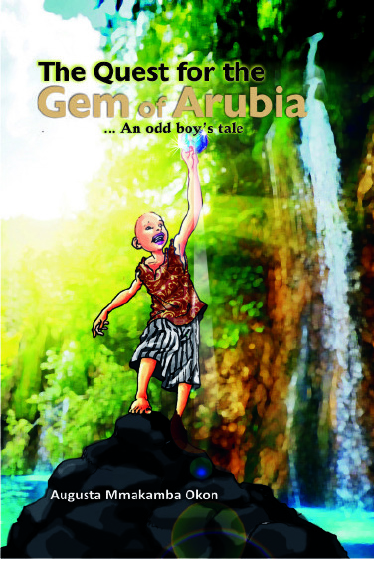Book Title: The Quest for the Gem of Arubia
Author: Augusta Mmakamba Okon
Genre: Children’s Literature
Pagination: 76
Year of Publishing: 2015
Publisher: Wicecom Publishers Limited
Reviewer: Adeniyi Taiwo Kunnu
The thrills that come with childhood and their accompanying boisterousness have found its way into the creativity of Augusta Okon. She is however on a journey with a tone of cautious expression of hope. This is owing to the fact that our living spaces happen to be dominated by adults, intermingling with a view to fulfilling dreams; but what happens to the ‘child’ to whom the future belongs, particularly the future that is full of dreams? In seven differently chapters, one flips pages of adventures which cause flurries to one’s emotions.
Leveraging the features of a peculiar skin colour and unique personality, Augusta surrounds Omorege – the albino son of Ehis and Adesuwa – with an uncanny ability to communicate with animals as well as his dexterity on the drums. A subtle and somewhat easy-to-neglect deliberateness is to have made an albino a major character, while one does not find this a regular creative tilt in most other children’s literature in the country.
The Quest for the Gem of Arubia is the emotive story of 10-year-old Omorege, whose genetic composition could only have been adduced for the pain that he repeatedly suffers because he lacks black pigment on his skin. His is a case that reminds one of Odewale in the famed The gods are not to blame. In Nsewe where he is born, albinos are discountenanced as bad omen; as such he is thrown into the evil forest. He was there for three days.
Rather than look ill, the rotund Omorege is back home with his parents after the trying times. He grows under their care. The death that could not hold him however wages the war of hatred and rejection against him among his peers and adults alike. Practically without friends at 10, Nana (the girl with dreadlocks) becomes his inseparable friend. She also is a super-kid of sorts and possesses the power to break riddle, while he has the quality of supernatural insight.
Rejected and distraught, Omorege questions his unfavourable experience and the harsh remarks about him. But he is spurred into self-belief when his father urges him on. Nana’s role in his life cannot be over-emphasised. She remains a friend whose positive and precocious persona seems remarkable. Perhaps the statement that ‘birds of a feather flock together’ makes this true. One lesson to be learnt is that life will never leave an individual without a form of support. In the face of his pains, little Omorege experiences reprieve. A drumming competition is organised, and being dexterous at it affords him the privilege of entering for the contest. Although quite a challenge at first and almost impossible because of waiting for parental consent, Omorege’s eventual participation results in him being the winner.
The moral of his life here is that the cloud is never entirely dark and, as such, having a careful look results in realising that silver lining across the dark firmament. The lesson of self-belief and staying strong in the light of daunting challenges has been communicated to the readers. Children could particularly learn this virtue in the face of rejection in school. Everyone may not be someone’s friend, but one’s parents and a true friend can be huge sources of inspiration.
Celebration, however, becomes short-lived when his parents are told that another chapter of his life just opened due to an ancient prophecy. If there is anything that children love, it is to be thrown into a fantastic setting where their fantasies are explored to unlimited stretches. This is exactly what the second phase of Omorege’s adventure brings up. The elders of the land who express their wariness at his birth are the ones who also show up in his home to announce the new weight of responsibility.
On page 18, elders Lekan, Adamu and Emeka say:
“Evil is about to be awakened. I have seen it. Dominus is free again.”
“Impossible! Going by ancient records, he was locked up in the valley of Acridon, in the realm of Aspirathis two centuries ago.”
“So the ex-watcher who gave into darkness and oppressed different realms is free once more.”
The elders’ conversation spells fear and doom. Besides, Omorege envisions the cataclysm which will result from the freedom of Dominus. As had been said, “to whom much is given – in this wise – much more is expected”. Omorege is the Chosen One, who must save the destiny of Nsewe.
What actually strikes one’s is the creation of repeated actions, which enables a child think of becoming a super-hero by taking on a number of responsibilities. Children love to do things that even adults consider them incapable of.
Albinism and rejection notwithstanding, Omorege braves the odd of low self-esteem to fulfil a daunting task.
The story, however, takes another turn after Nana and Omorege had solved all the riddles and crossed uncharted hinterlands of the underworld. The gem is in their possession, but for the evil one to be in eternal incarceration, the possessor of the gem will have to die. In the course of Omorege saying his last wishes, the orphan who accompanies him takes the gem and falls to her death. Nana pays the ultimate price to keep Omorege and Nsewe thriving.
The book will sure make a thrill-read, but it can benefit from a reduction in many unfamiliar names, which could be dexterously set or at best substituted for what children will be familiar with, while names of characters too would be better suited to children’s memories, if they are in the minimal and also sound a measurable note of the known.
In the words of the Guardian of Itupia and not forgetting Camara Laye’s fictive work,
“Weep Not Child”
“Arise and Return…”
“Carry out what she bid thee do, that her death be not in vain”
The legacy of positive continuity must never end, as children have to the flame of the future aglow.
• Kunnu is a Lagos-based literary scholar.













